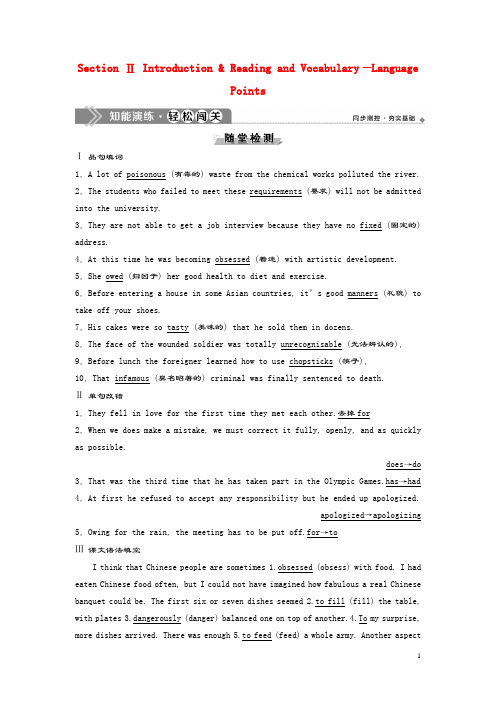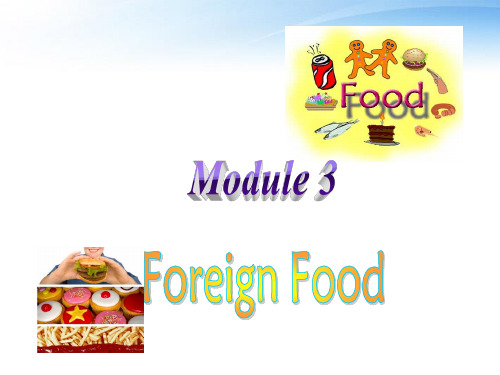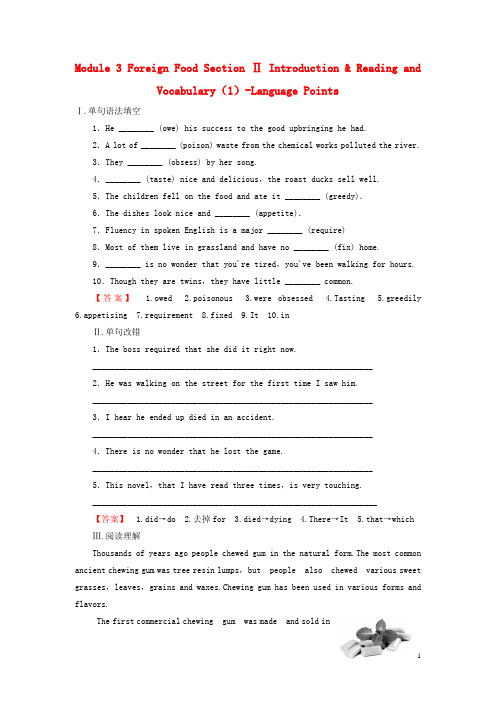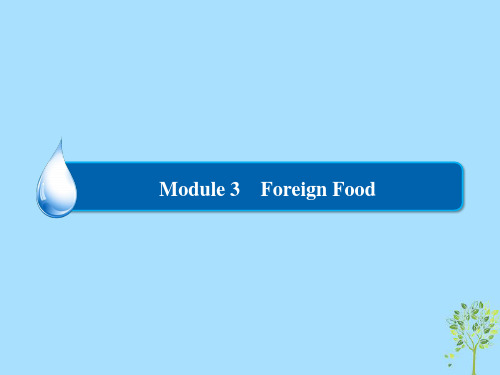高中英语Module3ForeignFoodSectionⅡLanguagePointsⅠIntroduction&ReadingandVocabulary教案
- 格式:docx
- 大小:367.94 KB
- 文档页数:10

Section Ⅱ Introduction & Reading and Vocabulary—LanguagePointsⅠ品句填词1.A lot of poisonous (有毒的) waste from the chemical works polluted the river. 2.The students who failed to meet these requirements (要求) will not be admitted into the university.3.They are not able to get a job interview because they have no fixed (固定的) address.4.At this time he was becoming obsessed (着迷) with artistic development. 5.She owed (归因于) her good health to diet and exercise.6.Before entering a house in some Asian countries, it’s good manners (礼貌) to take off your shoes.7.His cakes were so tasty (美味的) that he sold them in dozens.8.The face of the wounded soldier was totally unrecognisable (无法辨认的).9.Before lunch the foreigner learned how to use chopsticks (筷子).10.That infamous (臭名昭著的) criminal was finally sentenced to death.Ⅱ单句改错1.They fell in love for the first time they met each other.去掉for2.When we does make a mistake, we must correct it fully, openly, and as quickly as possible.does→do 3.That was the third time that he has taken part in the Olympic Games.has→had 4.At first he refused to accept any responsibility but he ended up apologized.apologized→apologizing 5.Owing for the rain, the meeting has to be put off.for→toⅢ课文语法填空I think that Chinese people are sometimes 1.obsessed (obsess) with food. I had eaten Chinese food often, but I could not have imagined how fabulous a real Chinese banquet could be. The first six or seven dishes seemed 2.to fill (fill) the table, with plates 3.dangerously (danger) balanced one on top of another.4.To my surprise, more dishes arrived. There was enough 5.to feed (feed) a whole army. Another aspectof “food culture” is 6.that the Chinese seem to eat almost every part of every animal.British people like cold food, 7.while in China,cold food means poverty—you don’t give it to a guest!I also learned that the English like to mix food before 8.serving (serve) it at the table. The food here goes against the Chinese sense of beauty and style at the dinner table. Chinese dishes can 9.be photographed (photograph) and have a nice 10.appearance (appear).Ⅰ单句语法填空1.Something must be done to prevent factories sending out poisonous (poison) gases so as to keep the city from being polluted.2.Despite the health problem caused by his excess weight, the wealthy businessman was still obsessed with making as much money as possible.3.It was not until the early 18th century that the significance of the event was generally realized.4.The fog was so heavy this morning that drivers could hardly make out the things just ten meters away.5.(2019·广东广州高二月考)There has been the requirement (require) that every child(should) be given (give) the opportunity to be educated.6.Though British English and American English have some differences in the spelling and pronunciation, they have much in common.7.There are so many green trees and beautiful flowers everywhere. It is no wonder that the air here is so fresh.8.Mr. Smith owed his success in his career to his family and teachers.9.The food, tasting (taste) good, soon sold out when it was taken to the market. 10.(2019·大连高二检测)He can’t have left (leave) without saying goodbye to them, for he always has good manners (manner).Ⅱ阅读理解AThousands of years ago people chewed gum in the natural form.The most common ancient chewing gum was tree resin lumps,but people also chewed various sweet grasses, leaves, grains and waxes.Chewing gum has been used in various forms and flavors.The first commercial chewing gum was made and sold in 1848 by John Bacon Curtis. He called his chewing gum the State of Maine Pure Spruce Gum. John Bacon Curtis andhis brother came up with the practical idea of how to make and sell spruce gum as chewing gum.On July 27, 1869, Amos Tyler received the first patent in the United States for chewing gum.However, Tyler never sold his gum commercially. An Ohio dentist, William Finley Semple was honored for this work using the first patent to manufacture (大量生产) chewing gum since December 1869.In 1869, Mexican General Antonio Lopez de Santa Anna told his idea of chicle (糖胶树胶) to Thomas Adams. Adams tried to make toys, masks, and rain boots out of chicle, but none of his products were commercially successful. Then he simply added flavor to the chicle! That was the first step in creating the world’s first modern chewing gum! The first mass marketed chewing gum was called Adams New York Chewing Gum. In the 1870s, Adams & Sons sold “Sour Orange” flavored gum as an afterdinner candy. In 1871, Thomas Adams patented a machine for the manufacture of gum. However, all these kinds of gum had one big problem: they could not hold flavor.The problem with holding flavor was not fixed until 1880, when William White combined sugar and corn syrup with chicle. For better taste he added peppermint extract (薄荷精). He found out that peppermint stayed in the gum during chewing much longer than other flavors.He called his first peppermint flavored gum Yucatan gum.In 1888, Thomas Adams’ chewing gum, TuttiFrutti, was the first chewing gum that was sold from a vending machine (自动贩卖机).【解题导语】本文介绍了“口香糖”的发明和发展历史。


Module 3 Foreign Food Section Ⅱ Introduction & Reading and Vocabulary(1)-Language PointsⅠ.单句语法填空1.He ________ (owe) his success to the good upbringing he had.2.A lot of ________ (poison) waste from the chemical works polluted the river.3.They ________ (obsess) by her song.4.________ (taste) nice and delicious,the roast ducks sell well.5.The children fell on the food and ate it ________ (greedy).6.The dishes look nice and ________ (appetite).7.Fluency in spoken English is a major ________ (require)8.Most of them live in grassland and have no ________ (fix) home.9.________ is no wonder that you're tired,you've been walking for hours.10.Though they are twins,they have little ________ common.【答案】 1.owed 2.poisonous 3.were obsessed 4.Tasting 5.greedily 6.appetising 7.requirement 8.fixed 9.It 10.inⅡ.单句改错1.The boss required that she did it right now.________________________________________________________________2.He was walking on the street for the first time I saw him.________________________________________________________________3.I hear he ended up died in an accident.________________________________________________________________4.There is no wonder that he lost the game.________________________________________________________________5.This novel,that I have read three times,is very touching._________________________________________________________________【答案】 1.did→do 2.去掉for 3.died→dying 4.There→It 5.that→which Ⅲ.阅读理解Thousands of years ago people chewed gum in the natural form.The most common ancient chewing gum was tree resin lumps,but people also chewed various sweet grasses,leaves,grains and waxes.Chewing gum has been used in various forms and flavors.The first commercial chewing gum was made and sold in1848 by John Bacon Curtis.He called his chewing gum the State of Maine Pure Spruce Gum.John Bacon Curtis and his brother came up with the practical idea of how to make and sell spruce gum as chewing gum.On July 27,1869,Amos Tyler received the first patent in the United States for chewing gum.However,Tyler never sold his gum commercially.An Ohio dentist,William Finley Semple was honored for this work using the first patent to manufacture (大量生产) chewing gum since December 1869.In 1869,Mexican General Antonio Lopez de Santa Anna told his idea of chicle(糖胶树胶) to Thomas Adams.Adams tried to make toys,masks,and rain boots out of chicle,but none of his products were commercially successful.Then he simply added flavor to the chicle! That was the first step in creating the world's first modern chewing gum! The first mass marketed chewing gum was called Adams New York Chewing Gum.In the 1870s,Adams & Sons sold “Sour Orange” flavored gum as an afterdinner candy.In 1871 Thomas Adams patented a machine for the manufacture of gum.However,all these kinds of gum had one big problem: they could not hold flavor.The problem with holding flavor was not fixed until 1880,when William White combined sugar and corn syrup with chicle.For better taste he added peppermint extract (薄荷精).He found out that peppermint stayed in the gum during chewing much longer than other flavors.He called his first peppermint flavored gum Yucatan gum.In 1888,Thomas Adams' chewing gum,TuttiFrutti,was the first chewing gum that was sold from a vending machine(自动贩卖机).【语篇解读】本文介绍了“口香糖”的发明和发展历史。



角顿市安康阳光实验学校Module 3 Foreign Food Section Ⅱ Grammar1.40,000 people are killed every year in road accidents in the US, many of ________ are caused by human error.2.Some people ________ are successful language learners often fail in other fields.3.In our class, we have some students ________ families are not in Wuhan.4.Tell him to go to the classroom ________ we often have our English class.5.That is the only way ________ leads to your success.6.The reason ________ she was late is not acceptable.7.Professor Li is extremely popular among students, ________ is known to all of us.8.The secretary with ________ the boss is not happy will be fired.9.The day ________ I met the famous pop star was the greatest day of my life.答案:1.which 2.who 3.whose 4.where 5.that 6.why 7.as8.whom 9.whenⅢ.单句改错1. This is the factory where we visited last week.________________________________________________________________ ________2. This is the watch for which Tom is looking.________________________________________________________________ ________3. The person to who you spoke is a student of Grade Two.________________________________________________________________ ________4. The house in that we live is very small.________________________________________________________________ ________5. The sun gives off light and warmth, that makes it possible for plants to grow.________________________________________________________________ ________6. I've read all the books which I borrowed from the library.________________________________________________________________ ________7. This is the best film which I have ever seen.________________________________________________________________ ________8. My father and Mr. Smith talked about things and persons who they remembered in the country.________________________________________________________________ ________9. Everything which we saw was of great interest.________________________________________________________________ ________10. His dog, that was now very old, became ill and died.________________________________________________________________ ________答案:1.答案:where→that/which或去掉where2.解析:英语中,有些短语动词,介词或副词不可与动词相分离。
Section ⅡIntroduction & Reading and Vocabulary—Language Pointsowe vi.& vt.欠钱;欠(债等);应给予;归功于(教材P29)Everything you see I owe to spaghetti.你看到的一切我都归功于意大利面条。
(1)owe sb. sth.=owe sth.to sb. 欠某人某物owe sth.to 把……归功于;为……而感谢owe it to sb. that... 多亏了;归功于(2)owing to 因为,由于①She still owes her friend 60,000 yuan.=She still owes 60,000 yuan to her friend.她还欠她朋友6万元。
②(牛津词典)Thanks for sticking up for me—I owe you a favour.谢谢你支持我,我欠你一个人情。
[即学即练]——单句语法填空①I owe an apology to you for being unable to travel with you.②(上海卷)Owing (owe) to bad weather, the flight was delayed for a couple of hours.③I owed_it to the doctors that I survived such a severe accident.[链接写作]——完成句子④我必须说我的这些成就都应归功于我的同事和朋友们的鼓励和帮助。
I must say I owe all the achievements to the encouragement and help from my colleagues and friends.no wonder难怪(教材P30)No wonder my fellow guests had had only a few bites of each dish; they knew what was still to come.怪不得跟我一起的客人每道菜也就浅尝几口;他们知道还有什么菜要上呢。
Section Ⅱ Language Points Ⅰ(Introduction & Reading andVocabulary)Ⅰ.单词拼写1.He met the foreign friends and gave a banquet (宴会) in their honour.2.You must chew (咀嚼) your food well before you swallow it.3.The Americans are not used to using chopsticks (筷子).4.His manner (方式) of treating his parents is scolded by many people.5.Would you like some coffee or dessert (甜点)?6.Snails are considered a good delicacy (佳肴) in France.Ⅱ.拓展词汇1.poison n.毒药→poisonous adj.有毒的2.taste n.味道;品味,爱好v.尝,体会→tasty adj.美味可口的3.obsess v.使着迷;使烦扰→obsession n.着迷;困扰4.greedily adv.贪婪地→greedy adj.渴望的;贪婪的→greed n.贪欲,贪婪5.infamous adj.臭名昭著的,声名狼藉的→famous adj.著名的6.appetising adj.开胃的,增进食欲的→appetite n.爱好,嗜好;食欲,胃口;欲望7.requirement n.要求→require v.要求;需要8.fixed adj.固定的→fix v.将……固定;安装9.unrecognisable adj.未被承认的;无法辨认的→recognisable adj.可认识的,可承认的,可辨别的→recognise v.认出,认可,承认→recognition n.认出,认可,承认[Ⅲ.1.be obsessed with/by 对……着迷2.no wonder 难怪3.end up 结束4.make out 看出;理解5.go against 违背,违反6.have ... in common 与……有共同点7.owe ... to ... 把……归功于……8.get used to 习惯于……1.[教材原句]The first six or seven dishes seemed to fill the table, with plates dangerously balanced one on top of another.首先上来的六七个菜好像已经占满了整个桌子,盘子都很危险地交互摞着。
[句型点拨]with的复合结构。
[佳句赏析](2016·四川高考满分作文)我们发现自己每天都在一个令人兴奋的世界里,阳光灿烂、树木苍翠、百花争艳。
We can find us in an exciting world every day, with the sun shining brightly, trees growing greenly and flowers coming out with all kinds of colors.2.[教材原句]The first time I saw a threeyearold kid cheerfully chewing achicken's head I had bad dreams for weeks.我第一次看到一个3岁的孩子高兴地啃着一个鸡头时,我一连做了几个星期的噩梦。
[句型点拨]the first time引导时间状语从句。
[佳句赏析]我第一次见到他时,他给我留下了好印象。
He left me a good impression the first time I met him.3.[教材原句]But one thing I do admire is the polite manner in which British people eat, even if it is just a potato.但是让我非常佩服的一件事是英国人吃饭的举止,哪怕仅仅是一个土豆,他们也会吃得斯斯文文。
[句型点拨]“do/does/did+动词原形”表示对谓语动词的强调。
[佳句赏析](2017·6月浙江高考满分作文)我确实希望你能加入我们,因为青山是一个如此好的放松地点,我们肯定会玩得很高兴。
I do hope that you could join us because Green Hill is such a fun place to relax and surely we will have a great time.1.Everything you see I owe to spaghetti.(P29)我把你看到的一切都归功于意大利面条。
★owe v.应给予;归功于;欠(债等);感激①He kept his word and paid me the money he owed me exactly on time.②The young writer owed_his_success_to his teacher's encouragement.这位年轻作家把自己的成功归于他老师的鼓励。
③I owed_it_to_you_that I finished my work in time.多亏了你帮忙,我才及时完成了工作。
④Owing_to your help, he finally finished the task on time.由于你的帮助,他最终按时完成了任务。
2.No wonder my fellow guests had had only a few bites of each dish; they knew what was still to come. (P30)怪不得跟我一起的客人每道菜也就浅尝几口,他们知道还有菜要上呢。
★no wonder难怪①No wonder they are so familiar to each other; you know, they are old friends.②It's_no_wonder/No_wonder_(that) hours.难怪你累了,你一直走了好几个小时。
③It's_a_wonder_that no one got hurt.没有一个人受伤,真是个奇迹。
④I wonder_if/whether you can tell me the answer to the question.我想知道你是否能告诉我这个问题的答案。
3.Stomach, intestines, ears, tongue, tail, hoof, and lungs are all likely to end up on the dinner table in front of you. (P30)胃、肠子、耳朵、舌头、尾巴、蹄以及肺都有可能在你面前的餐桌上被吃掉。
★end up结束,告终,结果为……①If you do that, you'll end up in failure.②The party ended_up_with a popular song.晚会以一首流行歌曲结束。
③Johnson worked hard in the company and ended_up_as a manager.约翰逊在这家公司工作很努力,最终当上了经理。
④We were planning to go out, but ended up watching (watch) the football game at home.我们本来打算出去,但是最后却在家看足球赛了。
4.The first time I saw a threeyearold kid cheerfully chewing a chicken's head I had bad dreams for weeks.(P30)我第一次看到一个三岁的孩子高兴地啃着一个鸡头时,我做了好几周的噩梦。
★The first time引导时间状语从句①We fell in love the first time we met each other.可用作连词的名词性词组还有:下次……时,每次……时,每次……时,最后一次……时,一……就等。
我一见到她就从人群里把她辨认了出来。
③Every_time he returns to his hometown, he always visits his playmates in his childhood.每次回到家乡,他总是去拜访他童年时代的玩伴。
[名师点津] for the first time只能用作句子的状语,不可用来引导状语从句,因为它不具有连词的功能。
5.I was amazed at their easy and graceful manner while I stood there feeling somewhat confused by the food. (P31)我惊讶于他们闲适优雅的举止,而我却站在那儿对他们的食物感到有些茫然。
★manner n.方式,方法;态度;(pl.)礼貌;规矩;(民族、时代的)风俗,习惯①Treat other people in the manner that you wish them to treat you.你希望别人如何待你,就应该如何待别人。
②Could you please tell us some table manners in Western countries?③The work should have been done in a more satisfactory manner.这项工作本来可以用更令人满意的方式进行。
④It's_bad_manners for a man to smoke in the public places where smoking is not allowed.一个人在不允许吸烟的公共场合吸烟是不礼貌的。
[联想发散] 注意表示“用这种方法”的介词搭配:①in this way ②with this method③by this means ④in this manner⑤by this approach6.It was quite hard to make out what they contained. (P31)很难弄清楚它们究竟是用什么做的。